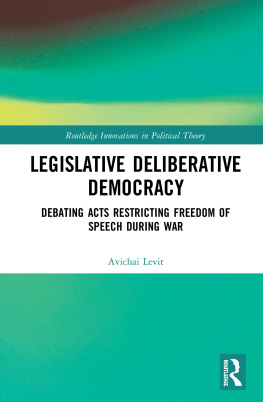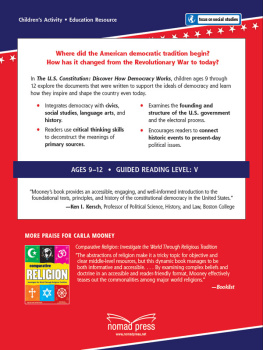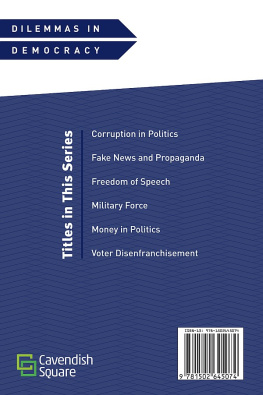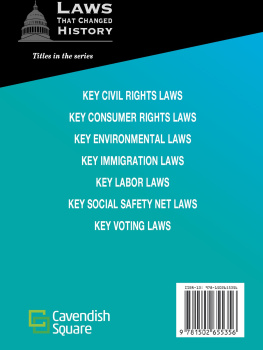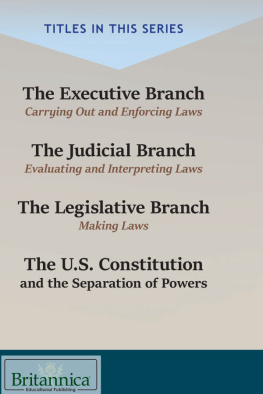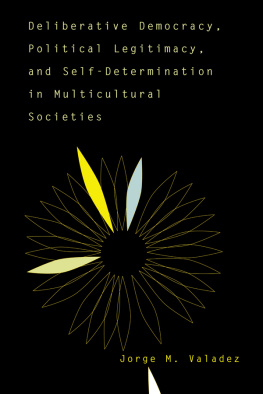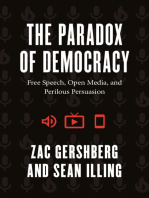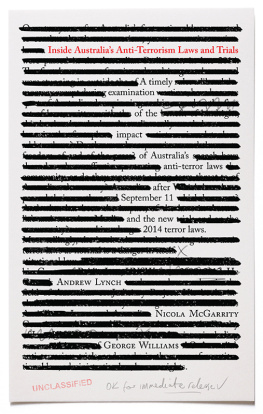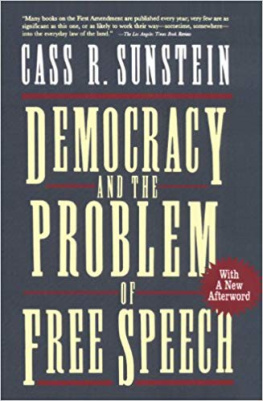Levits important book proposes that legislative restrictions on speech enacted during times of emergency are more likely to be democratically legitimate if the legislature has deliberated fully and well. Where Levit advances the argument is by developing a multi-faceted model we can use to determine if that sort of deliberation has occurred in specific cases. One of the books strengths is its close historical inquiry in several case studies to illuminate how his model of legislative deliberation works in practice. In so doing, Levit furthers our understanding of both the meaning and the possibilities of deliberative democracy.
John E. Finn, Professor of Government Emeritus,
Wesleyan University
This book has significant implications for recent developments in democratic theory as applied to the momentous decisions of wartime. As attention turns from deliberative democracy, the careful, informed consideration of alternatives by mass publics to democratic deliberation, most likely to occur within democratically authorized institutions, Levits case studies initiate the development of the much-needed relevant norms.
Daniel DiLeo, Penn State Altoona
What makes laws legitimate? Levit shows us legitimation in practice, examining how Congress restricted freedom of speech during modern crises. We learn how democracies deliberate to realize the common good while preserving fundamental rights, even in dark times.
Michael Kochin, School of Political Science, Government
and International Affairs, Tel Aviv University
Legislative Deliberative Democracy
Freedom of speech is a basic right in a democracy. During war, however, national legislatures tend to enact laws that restrict this basic right. Under what circumstances can such laws be democratically legitimate?
Avichai Levit argues that the degree of democratic legitimacy of laws that restrict freedom of speech during war depends on the extent of legislature deliberation on such laws. The more law makers in both chambers of the legislature seriously consider information and arguments, reason on the common good and seek to persuade and decide the best legislative outcome, in committees and on the floor, the more democratic legitimacy can be associated with such laws. This book fills a gap in the scholarly literature regarding the evaluation of the democratic legitimacy of laws that restrict freedom of speech during war, by bridging different theoretical perceptions and presenting an alternative normative account of deliberative democracy which focuses on the deliberations of a national legislature. Using the United States as a case study, Levit delves into the details of Congressional deliberation during World War I, World War II and the Cold War, as well as the political histories that brought about such laws.
Legislative Deliberative Democracy will be of interest to academics and students alike in the fields of political theory, American politics and political history.
Avichai Levit is a civil service professional and former diplomat. He is currently Deputy Department Director for Audit of the Ministry of Defense at Israels State Comptrollers Office, directing oversight activities of the national security sector. He is a visiting lecturer at Tel Aviv Universitys School of Political Science, Government and International Affairs.
Routledge Innovations in Political Theory
Aesthetics and Political Culture in Modern Society
Henrik Kaare Nielsen
Post-Fukushima Activism
Politics and Knowledge in the Age of Precarity
Azumi Tamura
Reconstructing Nonviolence
A New Theory and Practice for a Post-Secular Society
Roberto Baldoli
Rethinking Positive and Negative Liberty
Maria Dimova-Cookson
The Problem of Value Pluralism
Isaiah Berlin and Beyond
George Crowder
On Biopolitics
An Inquiry into Nature and Language
Marco Piasentier
Democracy, the Courts, and the Liberal State
A Comparative Analysis of American and German Constitutionalism
David J. Miles
Legislative Deliberative Democracy
Debating Acts Restricting Freedom of Speech during War
Avichai Levit
For more information about this series, please visit: https://www.routledge.com
First published 2021
by Routledge
52 Vanderbilt Avenue, New York, NY 10017
and by Routledge
2 Park Square, Milton Park, Abingdon, Oxon, OX14 4RN
Routledge is an imprint of the Taylor & Francis Group, an informa business
2021 Taylor & Francis
The right of Avichai Levit to be identified as author of this work has been asserted by him in accordance with sections 77 and 78 of the Copyright, Designs and Patents Act 1988.
All rights reserved. No part of this book may be reprinted or reproduced or utilised in any form or by any electronic, mechanical, or other means, now known or hereafter invented, including photocopying and recording, or in any information storage or retrieval system, without permission in writing from the publishers.
Trademark notice: Product or corporate names may be trademarks or registered trademarks, and are used only for identification and explanation without intent to infringe.
Library of Congress Cataloging-in-Publication Data
A catalog record for this title has been requested
ISBN: 978-0-367-56998-3 (hbk)
ISBN: 978-1-003-10056-0 (ebk)
Typeset in Times New Roman
by codeMantra
For Limor,
Bara, Ori, Yotam and Yaheli
Freedom of speech is a basic right in a democracy. During war, however, there is a tendency to curb freedom of speech. In the face of external threats, governing institutions restrict it. The United States is such a case.
In June 1917, eight weeks after Congress declared war on
During World War I over 2,000 people were prosecuted under the Espionage Act and approximately half were convicted.World War II.
In 1918 Congress legislated the Sedition Act,
This book is concerned with the phenomena of legislation by a national legislature restricting freedom of speech during war. Under what conditions can the legislation of such laws be considered democratically legitimate?
By democratically legitimate I mean that people consent to obey the law, even if they have reservations. People do not view the law as un
There is limited scholarship regarding an answer to this question. First, although the literature of war and emergency powers shows that governmental the literature does not explain the conditions under which the legislation of such laws can be considered democratically legitimate.
Second, while deliberative democracy theory offers an answer to the question of legitimacy of legislation in democratic political systems a democratically legitimate law is produced in a process of public discussion and debate in which participants reason on the common good the theory of deliberative democracy put forward by theorists such as is poorly suited for the real world: we live in large-scale democratic countries, and it is impossible for all the citizens in a country to participate in an ideal deliberative process.
Third, while libraries contain collections of epics on war, on domestic and legislative politics, and on civil liberties, there are only very few works that connect these subjects, and when they do, they are subjective analyses since they use values as a yardstick. Such substantive reasoning is problematic because of its subjective nature.

